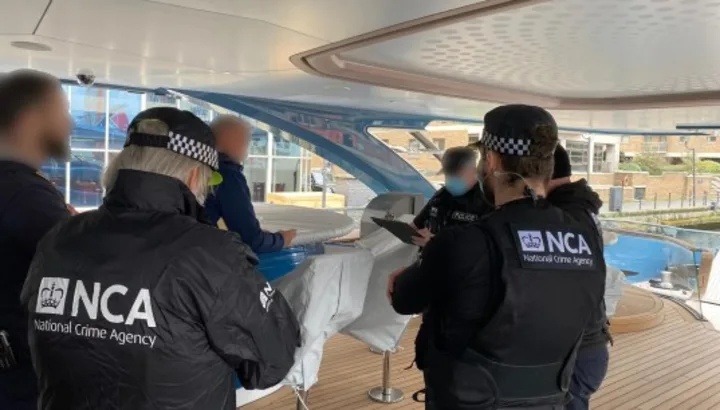
The UK Department for Transport (DfT) has confirmed to Nautilus International that seafarers are not within the scope of the sanctions regulations that the UK government is applying to Russian superyachts.
There was concern within the industry that the Russian (Sanctions) (EU Exit) (Amendment) (No.7) regulations 2022, which came into force on 30 March, might lead to the prosecution of seafarers working aboard superyachts with Russian owners.

These regulations prohibit the provision of ‘technical assistance’ to vessels connected with Russia, except in circumstances where failure to provide such assistance would cause danger to life or to the vessel.
However, it is now clear that while Russian superyachts are covered by the legislation, seafarers themselves fall outside its intended scope and are therefore able to work onboard without fear of prosecution.
‘We are very pleased to have received this clarification from the Department for Transport, which has been a matter of serious concern for our members,’ said Nautilus International head of yacht sector Derek Byrne.
‘While this will no doubt be a relief to many, we would remind those who are considering a job onboard a Russian yacht to consider their options carefully, and to remember that they may well experience problems in receiving their wages because of financial sanctions against Russia.’
On 1 March the UK amended the Russia (Sanctions) (EU Exit) Regulations 2019, imposing a wide range of sanctions against Russian vessels. The legal powers for the Secretary of State for Transport (SoS) to introduce such sanctions are contained in the Sanctions and Anti-Money Laundering Act 2018. The sanctions described below, apply to the United Kingdom, but not to Crown Dependencies or British Overseas Territories – check for any locally imposed sanctions.

Russian ships
The Sanctions Regulations, which are very detailed and technical, apply to the following ships (hereafter referred to as ‘Russian ships’):
- owned (whether legally, partially or by beneficial interest), controlled, chartered or operated by a ‘designated person’ (e.g. a person named by the SoS; click here for a current list)
- controlled, chartered or operated by persons connected with Russia; ‘controlled’ means taking decisions about its operation, including decisions about the route the ship may take and the appointment of master or crew; ‘person connected with Russia’ means an individual(s) who is ordinarily resident, located or (for companies) incorporated, constituted or domiciled in Russia
- those which fly the flag of Russia
- those registered in Russia, or
- ‘specified ships’ (by reference to its IMO number); the SoS may specify a ship if: (a) there are reasonable grounds to suspect that the ship is, has been, or is likely to be, used for the object or effect of contravening or circumventing the Sanctions Regulations; and, consider that it is appropriate for that ship to be specified, having regard to the purposes of the sanctions, which is to encourage Russia to cease actions destabilising Ukraine or undermining or threatening the territorial integrity, sovereignty or independence of Ukraine. Generally, a publication notification is to be made of specified ships.

Sanctions and directions
The Regulations set out specific prohibitions and empower the SoS and harbour authorities to issue directions. In practice, the Maritime and Coastguard Agency (MCA) will act on behalf of the SoS.

The Regulations prohibit persons/masters/pilots, from providing/permitting the access of Russian ships (if they know or have reasonable cause to suspect the same) to a port in the United Kingdom.
There are exceptions: where access to the port is needed by the ship in an emergency; alternatively, a ‘port entry direction’ (see below) may be issued to the master or pilot by the SoS or the harbour authority.
The SoS also has the power to issue a ‘port entry direction’ or a ‘movement direction’ to a harbour authority, ordering that a Russian ship proceeds to or enters a specified port, leaves a specified port, proceeds to a specified place, or remains where it is. The existence, contents or anything is done under these directions may be deemed by the SoS to be confidential and, if so, it is a criminal offence to disclose such information.
Furthermore, a harbour authority may issue a ‘detention direction’ to the master of a Russian ship requiring its detention at a port or anchorage in the United Kingdom. The direction must be in writing and state the grounds of detention.
Breaches of the above directions will amount to criminal offences.
The Registrar of Shipping must refuse to register (and may de-register) a ship if it appears to be owned, controlled, bareboat chartered or operated by (a) designated persons; or (b) persons connected with Russia.
On other hand, Nautilus International has recovered more than £1.6 million in unpaid wages for members working in the yacht sector over the past two years. Their newly released figures for 2021 show that the Union’s yacht team and legal department have successfully recovered more than £943,000 last year. This is the largest figure ever recovered by the Union, up by 26.8 percent from an already record-breaking figure of £720,000 in 2020.
Nautilus International

The specialist Union and professional organization for maritime professionals, a MUST to JOIN for all seafarers and yacht crew
The Union has an extensive range of services to help members experiencing employment-related problems and queries.















